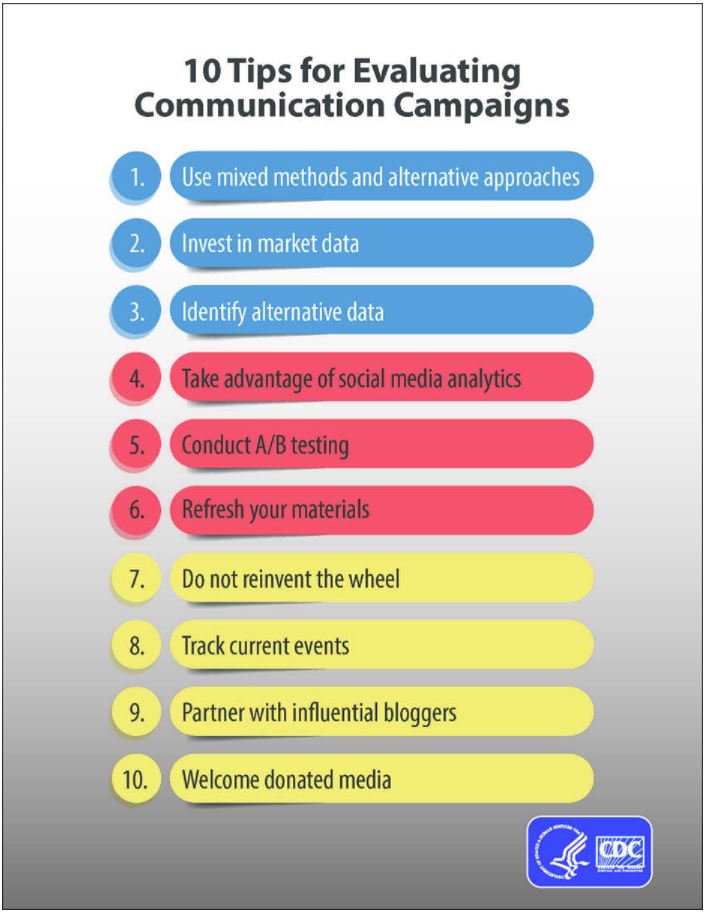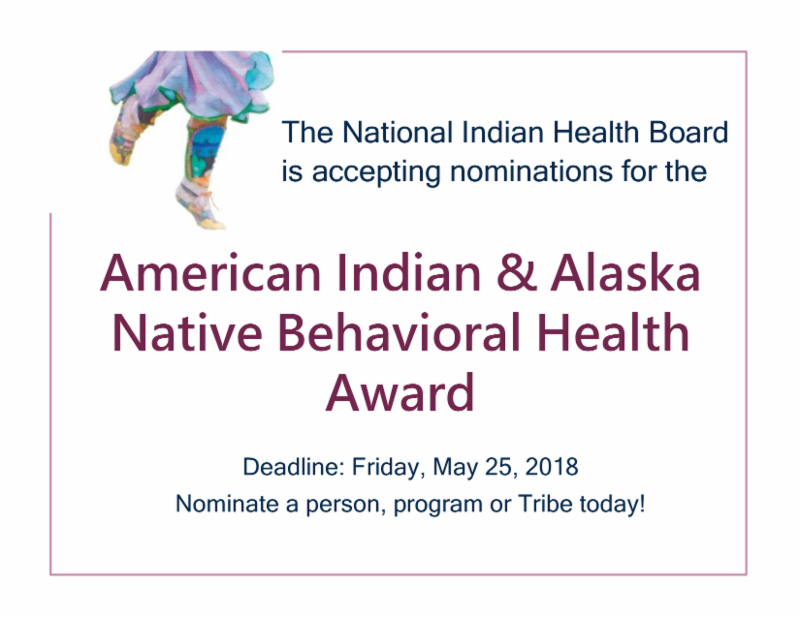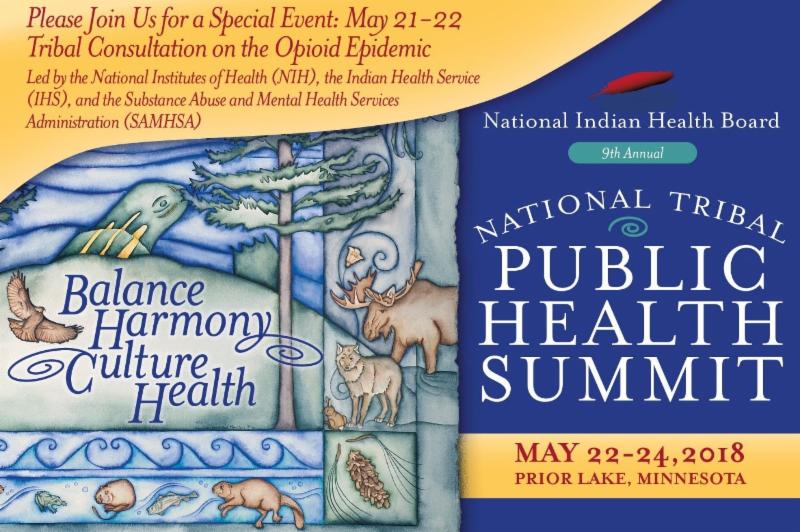 |
|
Upcoming
NIHB EVENTS!
9th Annual National Tribal Public Health Summit

Register,
Reserve your Room,
Sponsor, Exhibit and More
HERE
|
|
2018 AI/AN National Behavioral Health Conference
Register, Reserve your Room, Exhibit, and More
HERE
Join the NIHB Team!
Interested in joining a mission driven organization dedicated to
affirming and empowering American Indian and Alaska Native Peoples to protect and improve health and reduce health disparities?
NIHB seeks qualified candidates for the following open positions based in Washington DC:
Stay up to date on Health Policy news with NIHB's
|
|
|
 |
IHS Issues Dear Tribal Leader Letter on SDPI Funding, Initiating Tribal Consultation
On April 13th, RADM Michael Weahkee issued a Dear Tribal Leader Letter requesting Tribal Consultation on the funding distribution for the Special Diabetes Program for Indians for FY2019. This Consultation comes at the recommendation of the Tribal Leaders Diabetes Committee (TLDC). All 12 IHS Areas are encouraged to provide feedback on the current SDPI funding allocations. Please refer to the above letter and the
funding distribution table NIHB compiled from TLDC's April 4th virtual meeting for further details.
This is a 30 day consultation period. Comments can be submitted via email to
[email protected] or by contacting your Area's TLDC representative.
If you have any questions about the SDPI, please contact Carolyn Hornbuckle, NIHB's Deputy Director for Public Health Policy and Programs, at
[email protected].
Arctic Horizons Report Available
The Arctic Horizons recently released a report that "synthesizes the future research priorities that emerged over the course of the [Arctic Horizons] project," whose goal is to "assemble community input and recommendations on re-envisioning the mission, scope, future priorities, and resource needs of the Arctic social sciences research community." Learn more about the project
HERE
.
Recommendations mention addressing the "rapid loss of cultural heritage, including the loss of Indigenous languages and the destruction of archaeological sites through climate change" and research priorities include "community health and healing [and] social aspects of health" as well as "globalization and new colonialism," "innovations in data curation, management, sharing, discoverability, and access," and others. This document also describes situations that may impact Alaska Native villages, such as a "lack of meaningful change in wellbeing and health," and ongoing problems with public health concerns such as suicide. Although some progress has been made, northern regions experience disparities compared to southern regions. This may also be exacerbated by a "disconnect between decision makers in urban centers and people living in villages." Information sovereignty, Indigenous knowledge, and "historic traumas - including ethnohistoric research and oral history studies, working within communities to explore past and contemporary vectors of trauma" are also are among other important topics discussed during the report. Read the report
HERE.
|
 |
|
Free Courses in Climate Change Adaptation Planning
Application priority deadlines starting Wednesday, April 25, 2018 (depending on course)
The Institute for Tribal Environmental Professionals (ITEP) is offering upcoming courses in developing a climate change adaptation plan.
Climate Change 101 courses are available to offer a three-day, in-person introduction to climate change adaptation planning. Courses are available this summer in Alaska, Mississippi, and San Diego. Friday, May 4 is the priority deadline for the first 101 course, taking place in Alaska.
Climate Change 201 will "serve cohorts of [Tribes] working through the entire process of developing strategic climate change adaptation plans focusing on a particular topic. The training would take place over a 1.5 year time period and would be provided mainly in the form of 2-hour interactive web meetings every other week, one in-person meeting, and the completion of various assignments throughout the course." April 25 is the priority deadline for the 102 course.
Learn more or register
HERE

Evaluating Communication Campaigns

The Centers for Disease Control and Prevention (CDC) says that "[health] communication and marketing campaigns that promote positive behavior change are a cornerstone of public health and behavioral science. Designing and implementing quality campaigns on a tight budget and an urgent time frame is a challenge that most health communication professionals share. Research and evaluation are critical for a successful campaign. CDC is using leading research and evaluation methods to develop quality campaigns, while keeping costs low and sticking to tight timelines."
CDC has used the Domestic Zika Campaign as an example. This campaign worked to "increase Zika awareness among the general population and expectant parents in the United States and its territories. Campaign messages were also developed to change knowledge and attitudes regarding Zika transmission, beliefs about the risks of Zika, and the perceived ability (self-efficacy) to protect oneself against Zika. CDC identified several methods to get tailored messaging to [their] target audiences. Based on the work for this campaign, there are 10 methods that can help [...] reduce costs and improve the efficacy of [a] communication or health marketing campaign."
Learn more or read the detailed recommendations
HERE
Learn more about NIHB's Zika project and resources
HERE
|
|
|
Funding and Opportunities
|
|
CDC Tribal Public Health Capacity Building and Quality Improvement Umbrella Cooperative Agreement
Due Tuesday, April 24, 2018
The Centers for Disease Control (CDC) announces a new cooperative agreement for eligible federally recognized American Indian and Alaska Native (AI/AN) Tribal nations and regional AI/AN Tribally designated organizations to strengthen and improve the public health infrastructure and performance of Tribal public health systems. The intent of this program is to assist in public health infrastructure improvement; workforce development; Tribal data and information systems enhancement, including surveillance; and development and adaptation of evidence-based and evidence-informed interventions to increase the long-term sustainability of the collective Tribal public health system.
Applications are due Tuesday, April 24, 2018.
To learn more, Click
HERE and search under the opportunity number: CDC-RFA-OT18-1803
Native Behavioral Health Award: Call for Nominations
Due Friday, May 25, 2018 by 11:59pm ET

In an effort to honor individuals, Tribes, organizations, and programs that have enriched and improved American Indian and Alaska Native behavioral health, the National Indian Health Board (NIHB) invites nominations for the Native Behavioral Health Award. NIHB created this award to recognize excellence, achievement, and innovations that are above and beyond the call of service. NIHB recognizes that behavioral health is important to Native health and wellness, and that Tribes have led the way in creating and implementing behavioral health programming and services that align not only with contemporary needs, but with cultural beliefs as well. This award will highlight the work and vision of an individual, organization, Tribe or program that has worked to improve behavioral health status, implement new programming, address long standing health disparities, and/or increase the visibility of behavioral health concerns.
NIHB will present the award at the Annual National Tribal Behavioral Health Conference in Washington, DC during a plenary session. All nominations should be received by 11:59 p.m. ET on Friday, May25, 2018. The winner will be notified within three weeks upon close of the nominations.
Deadline: Friday, May 25, 2018 by 11:59pm ET
Anyone may submit nominations. To learn more or submit your nomination, click HERE
Learn more about the AI/AN National Behavioral Health Conference HERE
|
Cross-Jurisdictional Considerations for Addressing Zika and Other Public Health Threats Webinar

Nevertheless, Tribal-State-Local partnerships are valuable and important - especially for emerging public health issues like Zika which can require emergency response as well as interdepartmental and cross-jurisdictional cooperation. Zika concerns multiple stakeholders within Tribal systems - along with other public health allies from state and local health departments - including emergency management, environmental health, and public health, as well as arenas within healthcare systems such as maternal child health, behavioral health, community health, and primary providers. Moreover, disease knows no bounds and collaboration can benefit everyone mutually.
Using Zika as an example, the National Indian Health Board (NIHB) Deputy Director and Director of Public Health Programs and Policy, Carolyn Angus-Hornbuckle, JD, will discuss benefits to cross-jurisdictional collaboration and tools to use to advance partnerships.
This webinar is part of the NIHB Zika project and are made possible by funding and support from the Centers for Disease Control and Prevention (CDC).
*Note that times may vary if your state or Tribe does not follow major time zone patterns.
Quality Improvement Training, Tribal Accreditation Learning Community (TALC) May Webinar
Friday, May 11, 2018, 2:00pm-3:00pm ET
National Indian Health Board (NIHB) is pleased to announce the next session of the Tribal Accreditation Learning Community (TALC). TALC is a free, monthly webinar series held the second Friday of each month. It is designed for sharing and learning about public health accreditation in Tribal communities.
Quality Improvement Training
Quality Improvement (QI) is the use of a defined improvement process to improve the efficiency, effectiveness, performance, and outcomes of public health services. QI can be a valuable tool in the field of public health. Learn about QI basics, steps to developing a culture of quality, and review a variety of successful QI projects. Emily Vanderklok is the Community Health Outreach Manager with the Notawaseppi Huron Band of the Potawatomi. She is a certified QI Trainer through the Michigan Department of Community Health/Michigan Public Health Institute
For more information about TALC, and to view past webinars, click
HERE
To join this webinar, click
HERE
Zika Champions in Indian Country: Spotlight on Three Zika Projects Funded by the National Indian Health Board Webinar

Last summer, the National Indian Health Board (NIHB) announced a funding opportunity that would provide Tribes and Tribal organizations with up to $5000 to tackle one or two high impact, capacity building activities to prepare for the possibility of Zika transmission in Tribal communities. Three awardees received funding: Bishop Paiute Tribe (California), Indian Health Council (California), and Kaw Nation (Oklahoma). These Tribal champions have been striving to address this critical threat in creative ways within their communities and will wrap up their current projects at the end of April 2018.
"Zika virus has the potential to cause devastating health affects for Tribal communities and the next generation of indigenous children. This funding opportunity can help mobilize Tribes to take action for preparedness and response planning to help keep their communities safe."
-Stacy Bohlen, Executive Director, National Indian Health Board
This webinar highlights the three Tribes and their projects' successes, challenges, best practices, lessons learned, and ways that this work may be continued beyond the NIHB funding. Project activities include implementing an education campaign and engaging in vector control activities such as: holding partner meetings, participating in community health fairs, creating educational documents, identifying homes at high risk for mosquito activity, writing newsletter articles, providing Zika training to department leads, and distributing Zika kits.
This webinar and the NIHB Zika Response and Planning Mini Award program are part of the NIHB Zika project and are made possible by funding and support from the Centers for Disease Control and Prevention (CDC).
*Note that times may vary if your state or Tribe does not follow major time zone patterns.
NIHB 9th Annual Tribal Public Health Summit
May 22-24, 2018 in Prior Lake, MN

Summit Highlights:
- Pre-Summit 2-day Opioid Listening and Consultation Session! (free)
- Half-Day Pre-Summit Institutes!
- 5 Tracks and 2 days of over 40 workshops and roundtables!
- Fitness Event!
The National Tribal Public Health Summit is a premier Indian public health event that attracts over 500 Tribal public health professionals, elected leaders, advocates, researchers, and community-based service providers. This year's conference theme, "Balance, Harmony, Culture, Health", will provide evidenced-based, best, wise, or promising practices developed in and for American Indian and Alaska Native (AI/AN) communities.
For more information, visit the conference page
HERE
Sponsoring the 9th Annual Tribal Public Health Summit
We invite you to contribute to Tribal public health by becoming an official sponsor of the premier national AI/AN specific public health gathering. The National Tribal Public Health Summit (TPHS) offers key opportunities for allies, organizations and agencies to network, build relationships and establish partnerships with Tribal health leaders in an effort to address AI/AN health priorities. NIHB is honored to welcome your support for TPHS. We offer a variety of sponsorship levels with many benefits included. Sponsoring the TPHS provides a great opportunity to elevate the presence and visibility of your organization and work, as well as your commitment to Tribal public health and healthcare needs.
To view more information about sponsorship opportunities, including our sponsorship packages, click
HERE
Exhibitors and Vendors
Exhibitor and vendor registration is currently full. If you are still interested in exhibiting, email
[email protected]
to join the wait list.
Learn more about exhibiting
HERE
Lodging Information
NIHB has a room block at the conference hotel, The Mystic Lake Casino Hotel. To ensure the lowest rate, call 952-445-9000 or 800-262-7799 and ask for the NIHB block.
Online reservations can also be made
HERE
2018 American Indian & Alaska Native National Behavioral Health Conference
July 25-27, 2018 in Washington, DC
Registration is open!
For more information, visit the conference page
HERE
Exhibitors and Vendors
Are you interested in exhibiting at the AI/AN National Behavioral Health Conference? Exhibitor registration is open! The deadline to register as an exhibitor is July 13, 2018, but registration is first come, first serve and registration may close sooner for certain exhibitor categories.
Learn more about exhibiting or register
HERE
Lodging Information
NIHB has a room block at the conference hotel, Omni Shoreham Hotel. To ensure the lowest rate, call 202-234-0700 or 888-444-6664 and ask for the NIHB event block.
Online reservations can also be made
HERE
|
|
|
 |